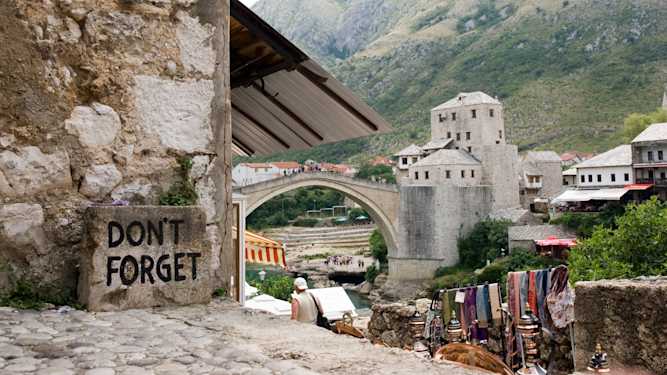
Bosnia 2025 - April
Throughout 2025, Ian Bancroft is collecting reflections on Bosnia-Herzegovina thirty years on from the end of the war. These reflections, supplemented by other insights and stories,explore various dimensions (peacebuilding, reconciliation, culture, education, politics), while reflecting on the past and the future.
To contribute your reflections on Bosnia-Herzegovina, please click here.
New skills are forged during war, some more useful than others. A story in Radio Free Europe/Radio Liberty - a station established during the Cold War to fight for the cause of freedom and democracy, but now threatened by savage cuts to US overseas aid - tells about the specially trained dogs capable of detecting landmines. Experts from Bosnia-Herzegovina train others. Man’s best friend will help save countless lives and limbs for many years to come.
I barely pass a soul on the road between Han Pijesak and Sokolica. The place is deserted as Spring shifts the stubborn winter. Livestock fend for themselves, albeit with few signs of urgency. The shepherds watch on from the shadows, puffs of chimney smoke their only confirmation of existence. Cows barricade the roads, staring down motorists with large, inquisitive eyes.
The sky appears larger, broader, as though behind a fish-eye lens, enhancing the sense of space emptiness. The plains are vast and untended. Houses are scattered with the randomness of confetti floating to the earth. The brown tones will soon be washed away by the sun, whose absence is more profound in these parts.
As we pass through Romanija, we drive above the clouds before dancing in their embrace. We weave through the forest before a truck filled with timber obstructs our progress.
It didn't have to be so, this sense of emptiness, not that there is much regret or remorse expressed by the locals who remain. Few of those displaced have returned. Those who did mostly came to die. The young people have built their lives elsewhere.
The mountainous region of Majevica in north-east Bosnia-Herzegovina is one of the few genuine examples of successful cross-entity cooperation. Though a source of intense fighting during the war, three municipalities in the Federation of BiH (Čelić, Sapna, and Teočak) and two in Republika Srpska (Lopare and Ugljevik) have built tangible ties between their respective communities.
A new bicycle route, Via Majevica, takes riders through the natural and historical sites that define the region, including mountains, lakes (Humačko, Mezgraja, and Sniježnica), mosques, churches, and Stećci (richly decorated medieval tombstone graveyards scattered throughout the country). A bi-annual race attracts cycling enthusiasts from across the entire region.
Co-operation doesn’t end there. A promotional film, ‘Majevica: A Different Story’, showcases the region’s tourist potential, whilst joint presentations were made at the Belgrade Tourism Fair and in Morska Sobota, Slovenia. Civil protection and firefighting units actively collaborate, meaning they can better respond to floods and forest fires. Waste management, energy efficiency, and rural tourism are all being jointly approached.
It also exemplifies the vital role the international community continues to play. The municipalities, whose mayors should be commended, were convened by the OSCE Mission to Bosnia-Herzegovina to promote co-operation. A shared vision of common challenges and opportunities quickly emerged, focused on tourism promotion and environmental protection. German money enabled the demining of the region, while EU funds through its flagship ‘Možemo bolje’ (‘We Can Do Better!) project supported infrastructure development.
It is a positive story that helps confront the wartime legacies exploited by radical voices intent on perpetuating mistrust and division; an example that other regions should consider replicating, not least because the country’s natural beauty is a shared asset for all.
To contribute your reflections on Bosnia-Herzegovina, please click here.
You can also contact Ian directly by clicking here.
Ian is a writer based in the Balkans. He is the author of 'Dragon's Teeth - Tales from North Kosovo' and 'Luka'. Follow Ian on Twitter @bancroftian.
Currently in: Belgrade, Serbia — @bancroftian
